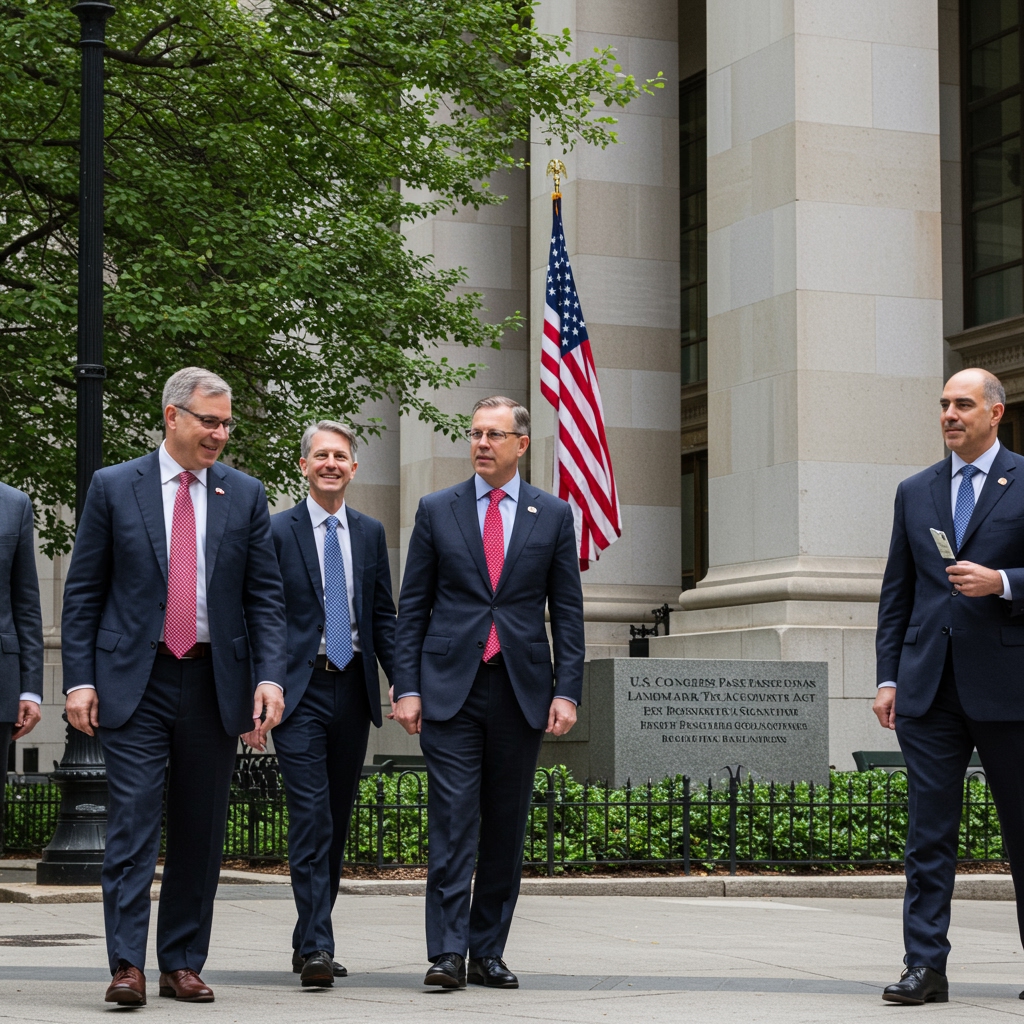U.S. Congress Approves Sweeping Tech Accountability Act
Washington D.C. — In a pivotal legislative moment, the U.S. Congress has successfully passed the “Tech Accountability Act of 2025,” a landmark piece of legislation poised to significantly reshape the regulatory landscape for major technology companies. The bill now heads to the President’s desk for signature following months of intense debate and negotiation on Capitol Hill.
The bipartisan effort, though marked by significant division, culminated in a final passage vote in the House of Representatives of 250-180, followed by a Senate approval of 58-42. The decisive votes signal a growing consensus among lawmakers that increased governmental oversight of digital platforms is necessary to address concerns ranging from user privacy to market competition.
Key Provisions Target Data Privacy, Algorithms, and Antitrust
The “Tech Accountability Act of 2025” introduces stringent new regulations aimed squarely at the operational core of major tech platforms. Its provisions are designed to enhance transparency, protect user data, and curb anti-competitive behaviors that critics argue have stifled innovation and harmed consumers.
Among the most significant components is a robust section on data privacy. The act mandates that users be granted far greater control over their personal data. This includes explicit requirements for companies to obtain clear, informed consent before collecting and using sensitive information, as well as providing users with accessible tools to view, manage, and delete their data. The goal is to empower individuals in the digital realm, moving away from what many see as an opaque and often exploitative data collection ecosystem.
Algorithmic transparency is another cornerstone of the legislation. Facing increasing scrutiny over the powerful and often opaque influence of algorithms on everything from news feeds to job applications and search results, the act requires the public disclosure of algorithm decision-making processes for certain high-impact applications. While trade secret protections are considered, the bill aims to provide researchers, regulators, and the public with unprecedented insight into how these systems curate information and make determinations, potentially mitigating bias and enhancing fairness.
The act also significantly bolsters antitrust enforcement capabilities, primarily empowering the Federal Trade Commission (FTC). The FTC is granted expanded authority to investigate and pursue anti-competitive practices by major tech platforms. This includes enhanced powers to conduct market studies, demand information, and potentially seek remedies such as structural separation or mandatory interoperability, depending on the nature and severity of the anti-competitive conduct identified. The intent is to level the playing field, prevent the abuse of dominant market positions, and foster greater competition within the digital economy.
Legislative Journey and Divided Opinions
The path to passage for the “Tech Accountability Act of 2025” was arduous. The legislation navigated numerous committee hearings, amendments, and floor debates in both chambers of Congress over several months. Proponents argued passionately that the bill was a necessary response to the unchecked power of tech giants, whose influence spans vast swathes of the economy and daily life.
Championing the bill throughout the process was Senator Maria Rodriguez (D-NY), who hailed its passage as a historic step towards creating a fairer, more transparent digital world. “For too long, these platforms have operated with minimal oversight, impacting everything from our privacy to our democracy,” Senator Rodriguez stated after the Senate vote. “This act puts power back into the hands of users and ensures that the rules of the road apply online just as they do offline.”
Conversely, the legislation faced fierce opposition from industry groups, most notably the Silicon Valley Policy Alliance. The alliance and its members argued that the bill’s provisions were overly broad, technologically unfeasible, and would stifle innovation. They contended that strict data regulations could hamper personalized services, algorithmic transparency requirements could compromise proprietary information, and expanded antitrust powers could disrupt beneficial mergers and investments, ultimately harming consumers and the U.S. economy’s global competitiveness.
Despite lobbying efforts and concerns raised by the industry, the momentum for federal tech regulation proved sufficient to secure passage in both the House and Senate with comfortable, though not overwhelming, majorities.
Implementation and Future Outlook
Assuming the bill receives the President’s signature, the “Tech Accountability Act of 2025” is slated to take effect on July 1, 2025. This timeline provides companies with a period to prepare for the new compliance requirements, although the complexity and scope of the changes are expected to pose significant challenges.
The implementation phase will likely involve extensive rule-making processes by regulatory bodies, particularly the FTC, to define the specifics of how the act’s provisions will be enforced. Legal challenges from tech companies are also widely anticipated, potentially delaying or altering the impact of certain aspects of the law.
The passage of this act marks a significant inflection point in the relationship between government and the technology sector in the United States. It signals a new era where accountability and regulation are likely to play a much larger role, moving beyond the largely self-regulatory environment that characterized the early decades of the digital age. The coming months, pending presidential approval and the lead-up to the July 1, 2025 effective date, will be crucial in determining the true scope and impact of this landmark legislation on the future of technology and digital life.





